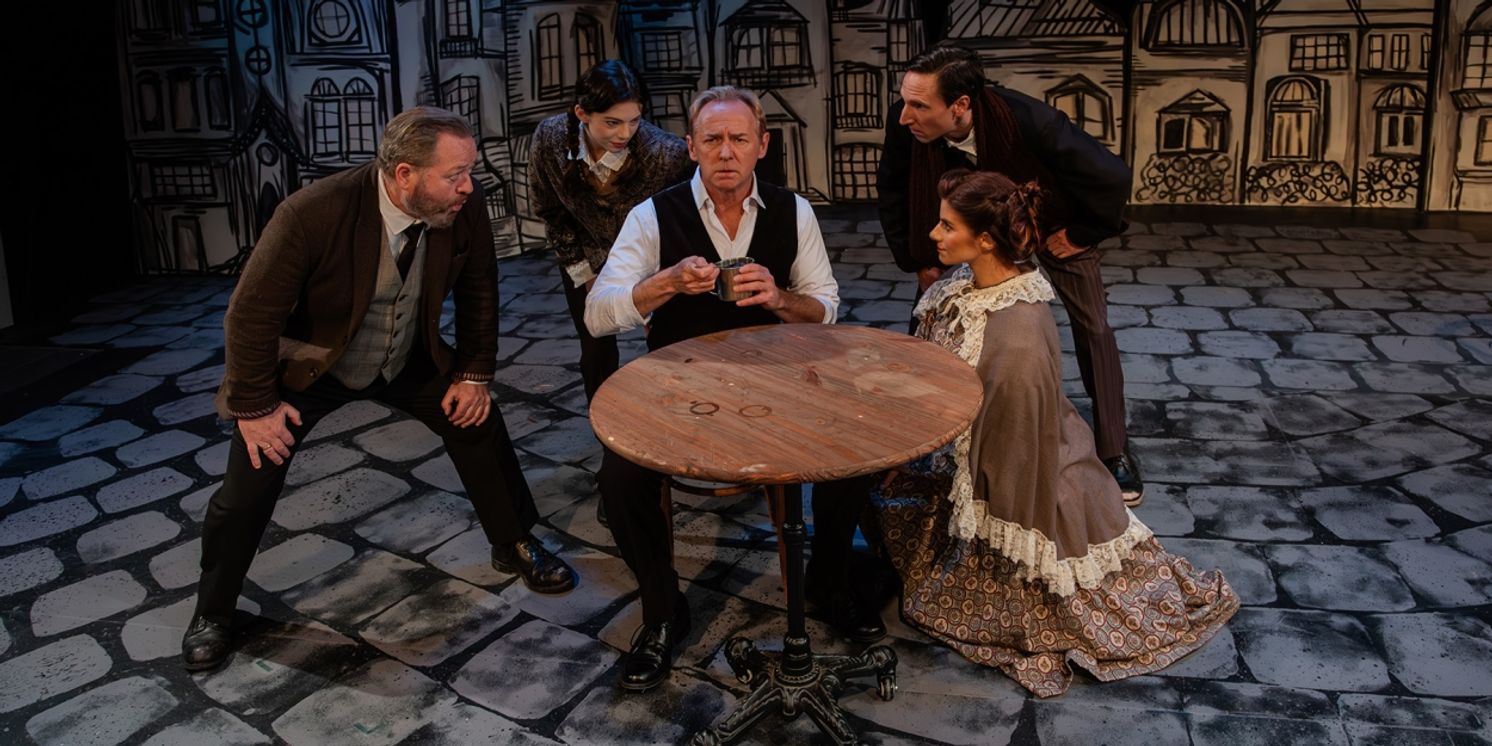Review: A SHERLOCK CAROL Blends Dickens and Doyle at Kinetic Theatre
Kinetic Theatre's Christmas offering runs through 12/22

It has long been posited that Sherlock Holmes is difficult to adapt well, because the nature of Arthur Conan Doyle's "Sherlock Universe" is so fragmented. Most of his memorable characters apppear only once and rarely interact; even more vexing, Holmes's own behaviors vary from the misanthropic and cold to the joyful and gregarious. How, then, does one construct the ultimate Sherlock Holmes story? The trick, it seems, is to not tell a Sherlock Holmes story at all, or rather, to impose Holmes and his cast of regulars (and Irregulars) into a narrative large enough to contain them all. As directed by Andrew Paul, Kinetic's A Sherlock Carol hits all the notes from seasonal cheer to seasonal depression, plus plenty of mystery, thrills and chills in between.
Author Mark Shanahan cleverly places the events of the story as both a sequel to A Christmas Carol and to the original Sherlock Holmes stories. Ebenezer Scrooge (James FitzGerald) has been a philanthropist and city father for half a century or so, and Sherlock Holmes (David Whalen) is in retirement- and a funk- after both vanquishing Moriarty and becoming a reluctant celebrity, thanks to the stories written by former sidekick Dr. Watson (Simon Bradbury). With no supreme nemesis to compete with, Holmes resigns himself to a lonely and disappointing life; after all, what is a petty crime to the mind that used to solve Europe's greatest mysteries? All that changes when street urchin Emma Wiggins (Carolyn Jerz) runs to Holmes to clear her father's name, launching the retired detective into a string of interlocking mysteries surrounding the mysterious death of Scrooge himself.
Shanahan's adaptation blends elements of Dickens's holiday tale with a number of Sherlockian adventures; literature nerds like myself will spot tips of the hat to "The Blue Carbuncle" and "The Hound of the Baskervilles," among others. All of these various strands of plot are strung together by David Whalen's central presence as the great detective. A veteran Holmes, David Whalen excels at both showing us the older, somewhat dissolute version of the legendary figure, and reclaiming his humanity and lust for life and adventure. In a sense, he's playing both Holmes AND Scrooge. Whalen is very much his own Sherlock Holmes, leaning on no specific media portrayal to set a template; if I had to describe his Holmes in terms of another Holmes, I would say his grim drollery and sharp-tongued humor tinged with melancholy falls closest to Hugh Laurie as alternate-universe Holmes Gregory House on House, MD. I was constantly impressed by Whalen's ability to conjure immense gravitas without any self importance; only a master can make us take a character seriously when that character no longer takes himself or anything else seriously himself.
Besides Whalen, everyone else in the cast plays multiple roles with aplomb. Simon Bradbury balances two of Doyle's most iconic roles, switching rapidly between Holme's kindly, gentle friend Dr. Watson, and the coarse and boorish Inspector Lestrade. Given that the two characters' costumes differ in little more than a hat, Bradbury does wonders with body language and a coarsening of dialect to differentiate the two. As Scrooge's housekeeper Mrs. Dilber, last-minute replacement Helena Ruoti blends comic relief and elements of the gothic. Ruoti had a script in hand, but rarely if ever consulted it, and her performance was as naturalistic and easy as anyone else in the cast. Caroline Nicolian shines as two very different women- one a countess with a hidden past, the other a hospital volunteer with a hidden talent. Her chemistry with Whalen is palpable in both roles. Carolyn Jerz flits in and out of the narrative as one of the frame story's primary storytellers. Her voice and command of the stage moves the plot along masterfully, only to then infuse a giddy, youthful energy into the minor roles of an enthuiastic street urchin or an Irish pub dancer. Lastly, the show's heaviest doubling of roles is handed to character actor Joseph McGranahan, who creates characters from an aging, good-natured doctor, to a pompous young businessman, with a good handful of more minor roles in between. McGranahan's physical acting does wonders here; given his tall and lanky frame, there is no mistaking him for anyone else, but his roles were as artfully differentiated and individuated as can be.
Have I forgotten someone? Indeed, I have not. James FitzGerald's Scrooge is more often felt in his absence than in his presence, but when he shows up in flashbacks and visions, he shows UP. FitzGerald makes it impossible not to fall in love with the kindly, grandfatherly Scrooge of his later years. (One of playwright Shanahan's cleverest tips of the hat to nineteenth century literature is a moment in which the reformed Scrooge is composited with the saintly Bishop of Digne from Les Miserables.) But it isn't all sunshine here; FitzGerald harnesses Scrooge's dark side in a number of ghostly apparitions. This ominous nature is compounded by the way the play suggests but never entirely states Scrooge has become a dark double of Moriarty to Holmes's increasingly morbid psyche. FitzGerald also gets a second chance to shine in his one-scene role as a lonely candlemaker, whose kindness not only helps Holmes find a clue, but helps him find his humanity again.
At this time of year, you would think I'd be worn out on A Christmas Carol, and I had genuinely expected to be. But Andrew Paul and his kinetic Kinetic cast won me over and restored a sense of the Christmas spirit and childlike wonder in me, just as Scrooge did for Holmes in the play. Could A Sherlock Carol become Pittsburgh's latest theatrical tradition? It very well could, and I'd be more than happy to see these people, and these characters, again next year.
Reader Reviews
Videos

